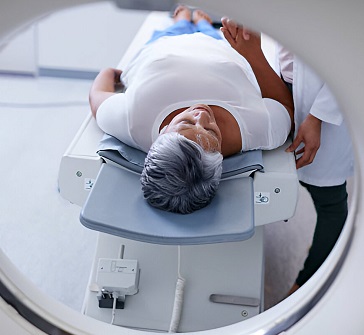 Book Appt.
Book Appt.
 Call Now
Call Now


Cervical Cancer ranks 4th on the list of most common cancers affecting women globally and 2nd amongst Indian women. It is gynecological cancer, which means that it only affects women. In the majority of cases, the symptoms are silent and become evident when cancer has progressed. The highest incidence of Cervical Cancer is seen in women in the age group of 35 to 44 years. Cervical Cancer accounts for 16.5 percent of all cases of cancer among Indian women.
What is Cervical Cancer?
Cervical Cancer, as the name suggests, is cancer that originates from the cells of the cervix, i.e., the narrow canal found at the lower end of the uterus, where it connects with the upper part of the vagina. HPV (human papillomavirus) happens to be the leading cause of cervical cancer, accounting for nearly 95 percent of all cases. Most cervical cancers are slow growing, however, there are some that can be extremely aggressive, such as small-cell carcinomas. Squamous cell carcinoma and adenocarcinoma happen to be the most common types, with the former accounting for 70 percent of the cases and the latter accounting for 25 percent.
What are the symptoms of Cervical Cancer?
The classic symptom of cervical cancer is abnormal vaginal bleeding, which may be experienced:
Patients may also experience the following:
When should you see a Specialist?
It is advisable to see a specialist as soon as you detect any of the above-mentioned symptoms. All these just point towards the possibility of you having cervical cancer but are not definitive. In order to confirm whether a patient has cervical cancer or not, doctors perform some physical examinations and tests. The sooner you consult a specialist, the quicker the diagnosis will be, leading to better treatment outcomes.
What causes Cervical Cancer?
There is no specific cause that can be pinpointed and it can be the result of several factors that can disrupt the normal functioning of the DNA, leading to abnormal cell reproduction. These malignant cells continue to build up in the body and lead to the formation of a cancerous mass, known as a tumor. Factors that are known to cause such changes in the DNA to include:
Modalities used for the diagnosis of Cervical Cancer
Treatment options available for Cervical Cancer
SHALBY Sanar International Hospitals provides extensive medical procedures backed up with our state-of-the-art technology and a team of highly qualified & experienced clinical experts.

Grade 2 Endometrium Cancer | Ms. Robiyakhon | Uzbekistan | Dr. Archit Pandit | SHALBY Sanar

Male Breast Cancer Recovery Story | Dr. Archit Pandit | Cameroon | SHALBY Sanar

Ms. Nafisa’s Inspiring Breast Cancer Recovery | Dr. Archit Pandit | Uzbekistan | SHALBY Sanar International Hospitals

Stage4 colon cancer is curable - Colon cancer with liver metastasis | Kenya | Dr Archit Pandit

Patient from Kenya Treated by Dr. Archit Pandit | SHALBY Sanar International Hospitals

Double Cancer Victory: Mrs. Salma Kapoor's Inspiring Recovery Story | Dr. Archit Pandit

Patient from Uzbekistan Treated by Dr. Archit Pandit | SHALBY Sanar International Hospitals

Patient from Uzbekistan Treated by Dr. Archit Pandit | SHALBY Sanar International Hospitals

Successful Carcinoma Buccal Mucosa Surgery of a Patient from Nigeria by Dr. Archit Pandit

Successful Colon Cancer Surgery of Mr. Faraidun Kaka Bra Amin Amin's from Iraq | Dr Archit Pandit

Miraculous Recovery of a patient from Uzbekistan battling Ovarian Cancer | Dr. Archit Pandit

Successful Cancer Detection & Surgery by Dr. Archit Pandit | SHALBY SHALBY Sanar International Hospitals

Successful Colon Cancer Treatment of a patient from Iraq by Dr Archit Pandit | Surgical Oncology

Successful Glottis Mass & Carcinoma Vocal Cord Treatment of a patient from Iraq by Dr Archit Pandit

Successful Stage 4 Colon Cancer Treatment of a patient from Kenya by Dr Archit Pandit

Surviving the Odds: 56-Year-Old's Journey with Recurrent Carcinoma Vocal Cord | Dr. Archit Pandit

Surviving Recto-Sigmoid Cancer: Mr. Syamand Ahmed's Inspiring Journey

Success Story: Iraqi Patient's Liver Tumour Treatment at SHALBY Sanar International Hospitals

Cytoreductive Surgery Success: Iraqi Patient's 30cm Ovarian Tumor Removed Safely

Beating Liver Cancer: Mr. Abdirashid's Inspiring Story

Ms. Nejood's Success Over Pancreatic Cancer: A Remarkable Journey

Transforming Smiles: Revolutionary Buccal Commando Procedure

Wide Local Excision Surgery & Microvascular Reconstruction of a Cancer patient

Successful Surgery of Esophgeal Cancer

Successful Lung Cancer Surgery of Ms. Jerioth Wanjiru from Kenya

Para Thyroidectomy on Pt Jawad Kadhim Tweli from Iraq

Dr Archit Pandit discusses the fascinating case of Geeta Rani
Our doctors pen down their research findings and experiences from time to time. Their words provide deep insight into the latest techniques, technologies and other advancements in healthcare. It provides expert answers to all kinds of health questions for real-life issues.
VIEW ALL




Since the day of its foundation, SHALBY Sanar International Hospitals is committed to provide comprehensive healthcare services. It regularly organizes awareness programs in its premises and encourages outdoor healthcare activities and camps with an intent to put focus on preventive healthcare.
VIEW ALL